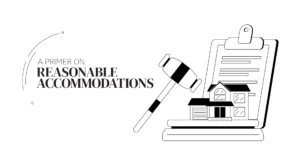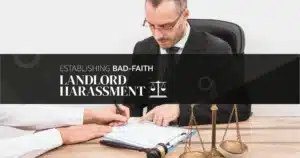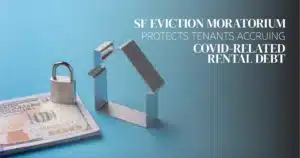Renting in California can be stressful. At times, it can feel like living under the constant threat of eviction. This is a direct result of housing costs, tighter rental markets, and post-pandemic regulations that have made tenants even more unsure of where they stand.
The good news is that you have the law on your side. By understanding tenant eviction rights in California, you can protect yourself from unfair or illegal evictions. These illegal actions include changing locks, shutting off utilities, and any other intimidation tactics aimed at forcing you out.
How can renters protect themselves? The simplest and most effective way is to learn about the law.
Let’s take a look.
What Are Tenant Eviction Rights in California?
The first thing tenants need to know about eviction is that there’s more to it than your landlord simply asking you to move out. Landlords cannot remove your belongings, change the locks, or intimidate you. There is a legal process that landlords must follow for the eviction to be considered valid.
In most rentals covered by California’s Tenant Protection Act (AB 1482), landlords must have ‘just cause’ to start the eviction process, but some homes are exempt (for example, many single-family homes with proper notice, owner-occupied duplexes, and buildings less than 15 years old).”
Under AB 1482, covered landlords must have a valid reason—such as nonpayment of rent, a serious lease violation, or certain no-fault reasons like an owner move-in—and must provide the legally required notice before filing in court if the tenant does not comply. Depending on the situation, notices can be as short as 3 days or as long as 30, 60, or 90 days.
This protects tenants from retaliatory evictions after they exercise their rights, report unsafe conditions, or request repairs.
Common Reasons for Evicting Tenants
Here are some of the most common reasons why a landlord may decide to evict tenants — legal or otherwise.
Legal Reasons for Eviction:
- Nonpayment of rent is a legal reason for eviction. If you haven’t paid rent after the legal grace period, your landlord may serve a written notice to demand payment or start eviction proceedings.
- Breaking any of the terms of the rental agreement is considered just cause for eviction. This includes having unauthorized pets or occupants.
- If the owner wants to move into the property or requests that you leave for substantial repairs and renovations, this is considered just cause for eviction.
Illegal Reasons for Eviction:
- Discrimination based on race, gender, religion, disability, or family status is illegal and cannot be used as a reason for eviction.
- Retaliation for reporting unsafe conditions or requesting repairs cannot be the basis for eviction.
- Lack of notice and self-help eviction practices are strictly illegal. This includes removing tenants’ belongings, changing locks, or shutting off utilities.
The California Unlawful Detainer Process Explained
Here’s what you need to know about the unlawful detainer process, the official legal eviction process in California.
Notice:
The first step of the eviction process is writing a notice addressed to the tenant. This could be a 3-day notice (for unpaid rent or lease violations), a 30-day notice (for tenants under a year), or a 60-day notice (for tenants over a year).
The purpose of a notice is to inform the tenant that they need to move and to give them enough time to do so.
Filing a Lawsuit:
If the tenant doesn’t comply with the notice, the landlord will have to file a formal eviction lawsuit. This is called an unlawful detainer. The tenant will receive a summons and complaint, which means the case has now officially begun.
Responding to the Lawsuit:
The tenant must submit a written response to tell their side of the story. This includes details about an improper eviction notice, retaliation, or other claims. The tenant typically has 10 court days to file a response after being served.
Court Hearing:
The court schedules a hearing after the tenant responds. Both the landlord and tenant are required to attend this hearing, where the judge decides whether the eviction is lawful.
Judgment:
The case reaches its conclusion once the court rules in favor of either the landlord or the tenant. If the landlord wins, a Writ of Possession is issued, allowing the sheriff to post a notice. This notice gives the tenant at least five days to move out. If the tenant does not move within that timeframe, the sheriff can legally remove them.
When to Contact a Tenant Rights Lawyer
If you’ve received an eviction notice, you should reach out to a tenant rights lawyer to help you stand up for your rights. Here are some instances when renters should take action:
- If you received an eviction notice that doesn’t give you enough time or the reasons feel unfair or unclear.
- If you’ve been pressured to move out without a clear court order, including shutting off facilities or removing your belongings to force you out.
- If you suspect retaliation or discrimination. This often happens after you’ve complained about or reported unsafe conditions.
Know Your Rights Before It’s Too Late
Eviction can feel overwhelming. You’re not only expected to respond to the notice — you’re also supposed to find a new place in a difficult housing market. Civil laws give renters strong protections, but that doesn’t always stop landlords from trying to evict them illegally.
That’s why it’s so important to work with an experienced tenant rights law firm. With a seasoned tenant rights attorney, you can defend your home and ensure your landlord follows the law.
If you’re facing eviction, contact The Law Firm for Tenant Rights, Inc. today for a free consultation — the first step toward protecting your rights.
Frequently Asked Questions
-
What are my tenant eviction rights in California?
Tenants have the right to receive proper notice, go through a legal eviction process, and be protected from unlawful or retaliatory evictions under California law.
-
What does “just cause” eviction mean?
Under the Tenant Protection Act (AB 1482), landlords must have a valid reason, like nonpayment of rent or lease violations, to evict a tenant.
-
How much notice must a landlord give before evicting a tenant in California?
Typically, landlords must provide a 3-day, 30-day, or 60-day notice, depending on the situation and the length of the tenancy.
-
What is an unlawful detainer case?
An unlawful detainer is the formal court process a landlord must file to legally remove a tenant after notice has been served.
-
Can I be evicted for complaining about repairs or conditions?
No, that’s considered a retaliatory eviction, which is illegal in California. Tenants have the right to report issues without fear of losing their home. However, if you withhold rent because of conditions you’ve complained about, then the landlord can issue a 3-day notice to pay or quit and if you don’t pay, they can file an eviction lawsuit.
-
What if I can’t pay rent due to financial hardship?
You may qualify for local or state rental assistance programs or negotiate a payment plan. A tenant rights lawyer can help you explore your options.
-
Can my landlord lock me out or shut off utilities to force me out?
Absolutely not. “Self-help” evictions, like changing locks or turning off power, are illegal in California.
-
What should I do if I receive an eviction notice?
Stay calm, don’t ignore it, and seek legal help immediately. The sooner you respond, the better your chances of protecting your rights.
-
How can The Law Firm for Tenant Rights, Inc. help me?
Our attorneys specialize in California tenant eviction rights and defenses, helping renters fight wrongful evictions and stay in their homes.





